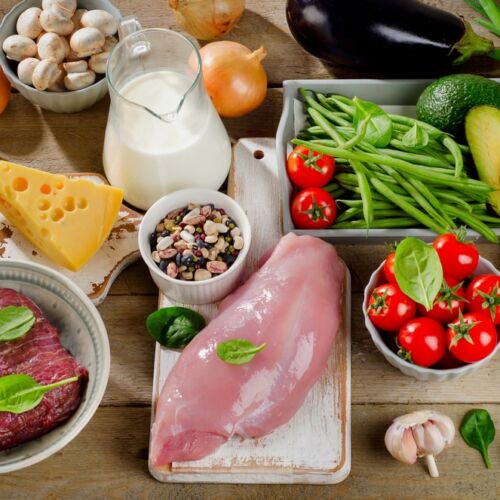Interview with Marlee Coldwell, Gut Health Dietitian
by Ashley Peters

Like many Dietitians, Marlee Coldwell’s journey to where she now has many twists and turns.

On to the interview with Marlee Coldwell, RD
How did Marlee Coldwell find her way from a Dietetic intern to private practice?
I did my Bachelor of Science in Human Nutrition and my integrated Dietetic internship at St. Francis Xavier University. I found there weren’t many job opportunities for me in my home province, Nova Scotia.
Consequently, I made my way out here to Alberta.
At the time, I had family here, and it felt like a natural step to try Calgary.
I was working at a retail job. After that, I found my first Dietitian position in a private doctor’s office, which was a great experience. However, I knew I wanted to be in a more specialized position where I could become an expert – what’s that saying a “jack of all trades but a master of none.” That’s how I felt in my first Dietitian role.
After moving to Calgary, I was following some local dietitians who were doing some cool things and enjoyed the content from Andrea Hardy, the owner of Ignite Nutrition Inc. Sure enough, 1.5 years later, she posted a Dietitian position at her clinic. I applied (with lots of nerves – I wanted it).
I was so thrilled to work with her and get the chance to finally specialize in digestive health (plus other areas of nutrition) – however, about 75% of our patients are digestive health clients. Funny enough, I never pictured myself being a gut health Dietitian, but I’ve learned through this position that it’s a HUGE passion of mine. Poop talk is encouraged with me!
What is the most rewarding part of being a Dietitian at Ignite Nutrition? What has been your biggest challenge so far?
It is exciting to see people get excited about food, especially after months or even years of feeling like food is a burden.
Whether a patient has IBS or has a challenging relationship with food, I see so many people struggle to enjoy food because it’s always been something they associate with health problems. My main priority is still to be the least restrictive possible while also improving health outcomes – and many people don’t fully understand those two goals don’t have to be mutually exclusive!
The biggest challenge is keeping up with the ever-changing research! Dietetics is not a stagnant profession at all, especially in the digestive health field where I work. Even from the time, I was in university 6-7 years ago, so much has changed!
It is so important to continue reading, learning, and communicating with other health professionals and researchers. Luckily, I love learning new things, and it’s a fun part of the job!
I see you wrote an educational cookbook for PCOS diet and lifestyle management. What motivated you to write this?
At Ignite Nutrition, we do a lot of nutrition counselling for women’s health issues – particularly patients who have PCOS, infertility, and hormonal concerns. With hormonal conditions like these, we chat a lot about insulin resistance and insulin levels play a significant role.
Research shows that improving insulin sensitivity (how well we respond to increases in insulin levels) can positively impact our androgen hormones like estrogen and testosterone, which is very important in PCOS! In practice, I was seeing that these people didn’t have a great understanding of insulin resistance or which foods can help or hinder their condition.
When the opportunity presented itself to write a book, I had to jump at the chance. My goal was to ultimately provide a manual for dealing with insulin resistance – with simple definitions, fundamental education about the science, and many easy recipes to match the information. And I feel like I succeeded!
You specialize in many aspects of digestive health. Can you share what it’s like to use Intuitive Eating with your clients?
There’s no doubt that we live in a VERY weight and diet-focused world. Therefore many of my patients also expect the same conversations from a Dietitian. However, I am very clear from the beginning with my clients – we will focus on health behaviours and aim to create sustainable changes that will ultimately impact health positively, whether weight changes or not.
With my gut health patients specifically, we often implement short-term elimination diets to identify symptom triggers. This can be pretty triggering for those with a poor food relationship or a history of yo-yo dieting. Therefore, I always screen people before starting an elimination diet – even for a short period.
There are always ways to modify or meet in the middle to ensure people are eating intuitively and maintaining a healthy food relationship! My goal is still to improve symptoms while also being the least restrictive possible.
How do you blend Intuitive Eating with meal prep and planning (if you do)?
I get requests for meal plans with specific intentions in mind – weight loss, muscle gain, feeding a busy family, etc. However, my experience with meal plans is that they are generally a short-term solution for my clients.
Nobody wants to eat the same menu week after week, and disruptors will inevitably happen – like a birthday party or a potluck at work. Instead, I like to work with my patients to help them build their meal planning skills. And this revolves entirely around Intuitive Eating – I encourage them to think about questions like: “Do you like to eat breakfast before or after you get to work? What do you ENJOY eating for lunch? What time of day do you notice your energy levels dipping?” and ultimately, I encourage them always to put their hunger cues first. If you have a snack planned at 3:00 pm but feel hungry at 1:30 pm – eat!
As a private practice Dietitian, where do you look to find reliable and accurate resources for your clients?
My answer isn’t fascinating…
I mostly use academic journals to keep up with the latest nutrition science on the back end. Additionally, at Ignite Nutrition, we create many of our client resources, particularly for our gut health patients, as this is our most significant client base. We use Monash University for a lot of our IBS and low FODMAP diet information in particular.
The food environment we all live in is loud and often misinformed; what is the best method you’ve found to offer your clients clarity and confidence? E.g. resources or education around looking for junk science or talking about Dietitian credentials etc.
The best advice I’ve ever been given is to listen first and react second. As nutrition scientists, dietitians are inclined to lead with science to ‘prove our credentials’ and create buy-in with our patients. This certainly used to be my method when I started in Dietetics. I would cut in with phrases like “well actually…” or “they’ve proven that isn’t true.”
However, even if Dietitians know something to be “junk science,” it’s important not to jump in too headstrong. Just because something isn’t true doesn’t mean it isn’t your patient’s truth.
I’ve learned now how important it is to validate that before debunking their beliefs. If we discredit their feelings, it can make them feel small, naïve, or ashamed. Instead – listen first, offer empathy and validation, and THEN challenge those beliefs. I like to finish by asking questions like, “do you feel that behaviour makes you healthier?” or “what do you feel would happen if you stopped eating that way?”
This generally steers the conversation in a more thought-provoking and science-focused direction!
What is your hope for the Dietetic profession in the future?
Educate students about Intuitive Eating and Health at Every Size!
My time in the classroom was entirely weight-focused and very clinical, which is, of course, an essential aspect of the Dietetics profession. However, health behaviours shape health, not the number on the scale.
We now know that other lifestyle and socioeconomic factors are likely to impact health outcomes more than weight. Still, weight continues to be the most significant risk factor discussed amongst health professionals.
As dietitians, I think we’re doing a great job with shifting the conversation in a less weight-focused direction, but it can only continue to get better. In particular, I think we can be using our voices and knowledge of Health at Every Size to better inform other health professionals around us. Sure, this can lead to uncomfortable conversations at times – but that’s important to initiate change!
What is the most common misconception people have about meeting with a Dietitian?
I always joke that people think Dietitians are the food police, and we’ll scold you for your food choices. I see it in my work life and my personal life – for example, how people flinch or slowly back away from the chip bowl at a party when I tell them what I do.
However, I didn’t get into this profession because I hate food! In fact, it’s the opposite. I want my clients to be able to enjoy their favourite foods without shame and guilt. It’s a huge misconception that Dietitians push the agenda of diet culture and restriction, which is usually the reverse!
Dietitians don’t advocate for ‘health at all costs because food is more than just a vessel for health – it’s cultural, social, emotional, AND nourishing.
Can Marlee Coldwell offer any words of wisdom for new graduate Dietitians? Particularly, new Dietitians who are unsure of what kind of Dietitian they want to be or where they want to go with their degree.
Follow Dietitian on social media, attend networking events, and overall just put yourself out there and ask questions.
When I graduated, I didn’t even know half the things Dietitians could do. You can pave your way as a Dietitian OR stick to a more traditional path if that interests you.
Additionally, be realistic with yourself. You may not get the ‘dream job’ right from the beginning. But try things out! Every role is a learning experience and a lesson in what you do or don’t want for your career.
I’m a firm believer that if you put in the work, opportunities will present themselves! I mean, look at me – I moved to a city where I had zero connections three years ago, and now I feel like an integrated part of the fantastic Dietetics community here. I can’t wait to see where I’ll be in 3, 5, or even ten more years!
Get in touch with Marlee Coldwell here
Authors: Ashley Peters is a Dietitian Student at the University of Alberta, and Marlee Coldwell is a Registered Dietitian at Ignite Nutrition



